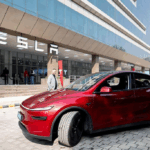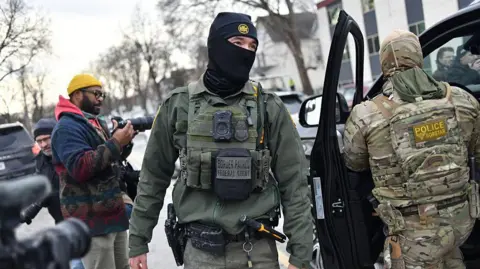
Tesla has opened its largest sales and service hub in India even as the EV giant struggles with weak sales in Asia’s third-largest economy.
The centre in the northern city of Gurugram combines an experience showroom, charging, and after-sales services under one roof.
The EV maker has sold just over 100 cars in India since its much publicised debut in July this year, dealership data shows.
Sources close to the company told the BBC that Tesla is now focusing on strengthening India’s EV ecosystem in a bid to revive sales momentum.
Tesla didn’t directly respond to BBC queries on the low sales figures.
The Elon Musk owned EV maker has been struggling to get a foothold in India since its launch in July, receiving bookings for barely over 600 cars till mid-September, according to media reports.
Dealership data accessed by the BBC shows only a small portion of these bookings converted into sales since deliveries started in September, even as competitor models in the premium category, from brands like BMW, BYD and Mercedes Benz reported robust sales aided by festive demand and tax cuts.
The EV maker’s plan to improve sales is said to include a three-pronged strategy to increase adoption, install more charging stations across the country and boost customer experience.
High taxes and slow adoption remain major barriers to EV growth in India, experts say. For Tesla, the steep upfront price of its cars is another challenge.
But speaking at the Tesla Centre launch in Gurugram, India head Sharad Agarwal said buyers can recoup up to two million rupees ($22,400; £16,900) over four years on fuel and maintenance – a third of the price of its Model Y sold here.
“Most of the [maintenance] service is done remotely through software updates, which reduces cost of ownership. And cost of home charging is one tenth of petrol prices,”Mr Agarwal said.
“Their [sales] numbers are low by any standard,” Hormazd Sorabjee, editor of Autocar India told the BBC. “But I think that’s strategic. They have just put their foot in the door in India. And they have good potential to increase sales here in the time to come.”
EVs make up less than 3% of passenger vehicle sales in India, and charging infrastructure has been slow to develop – the country has only around 25,000 charging stations.
Tesla’s cars can be charged at home, adding up to 44 miles (70.8km) of range per hour. The company is also expanding its network, including superchargers that can deliver about 170 miles in 15 minutes.
Tesla’s weak India sales come amid a broader slowdown in demand across its biggest markets – Europe, China and the US.
The company’s profits fell in October despite record quarterly revenue, boosted by a last-minute rush from US buyers to claim an expiring tax credit.
The firm said revenue for the three months to the end of September hit a record $28bn (£21bn), up 12% from the same time last year.
But the company’s profits dropped by 37% for the same period, partly due to extra costs linked to tariffs and research and development.
In India, Musk has shown little interest in local manufacturing, opting for an import-led strategy despite incentives announced in March last year to attract global EV makers.




